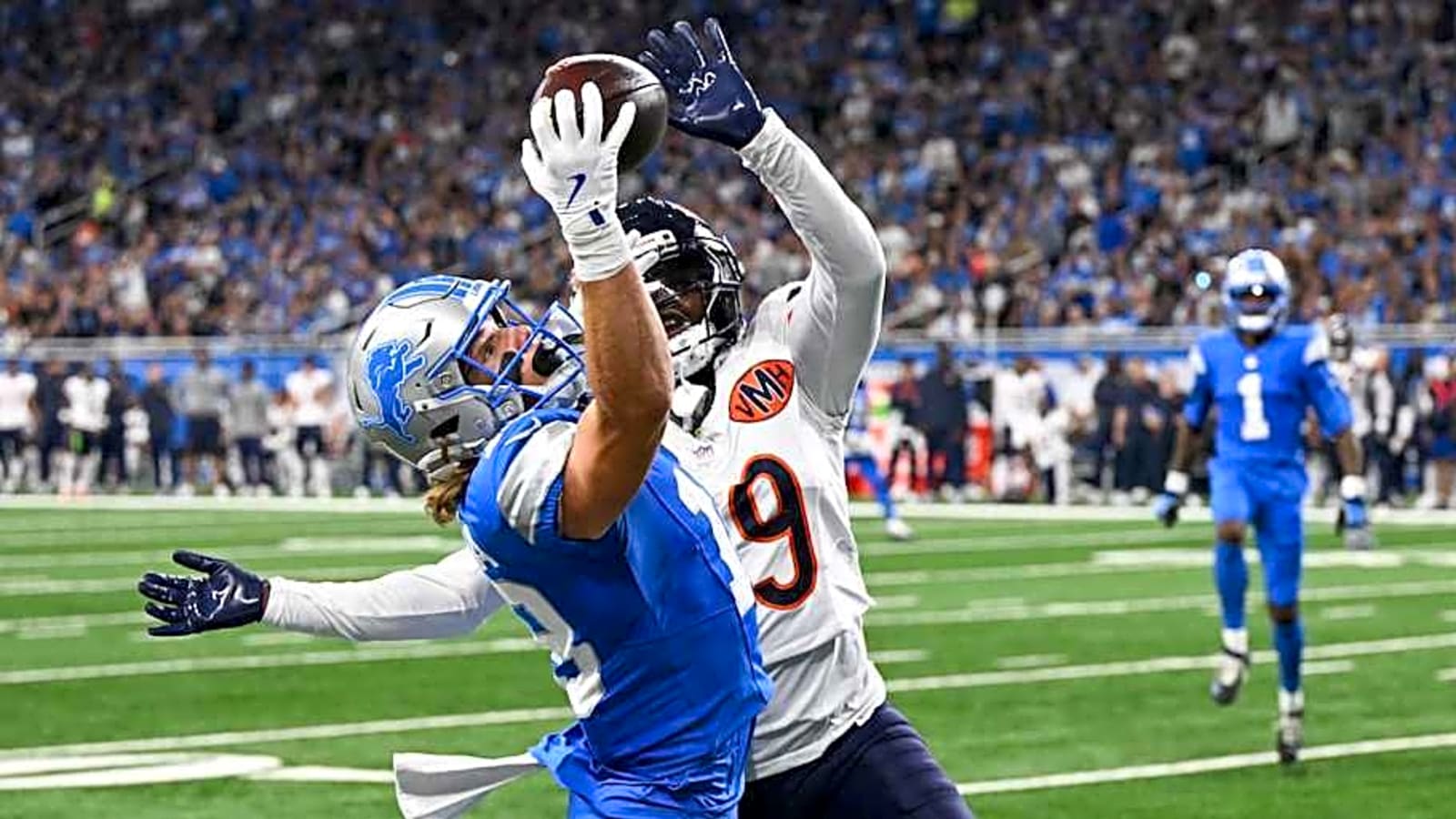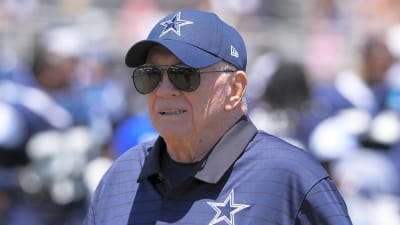
Last week it was Ben Johnson forced to explain why the Bears couldn't get the clock stopped by kicking off late in the game out of bounds.
On Sunday, officials were trying to explain why the clock did stop just before halftime, much to the Bears' chagrin.
It was as big a turning point as a 52-21 blowout loss could have for the Bears.
The clock should have kept running on Isaac TeSlaa's one-handed grab against Tyrique Stevenson's coverage by the boundary at the 4-yard line but officials ruled it should have stopped. They looked at replay and it showed TeSlaa down in bounds. If it had kept running from the time TeSlaa hit the ground, Detroit would probably not have had time to come down, line up and down the ball before the half ended.. But they had the time later because only a 10-second runoff could be allowed to make up for the mistake, and this gave them sufficient time to score on a 4-yard TD pass to Amon-Ra St. Brown by Jared Goff.
Hope these refs get investigated for betting. No holding calls against the Lions. Phantom holding calls against the Bears. Late hits out of bounds with no calls. Guy gets tackled in bounds and they stop the clock for one more chance before the half. 1 call against Lions
— Chris Golden (@Chris__Golden) September 14, 2025
Pro Football Writers Association pool reporter Nolan Bianchi interviewed NFL vice president of instant replay Mark Butterworth about what transpired.
PFWA Question: What was initially called on the field and did two officials rule two different things (on the pass from Jared Goff to Isaac TeSlaa late in the second quarter)?
Mark Butterworth: "They ruled that it was a completed catch with the receiver out of bounds. The impact of that ruling is the clock stopped because they ruled him out of bounds. If they ruled him in bounds with the catch the clock would continue to run. We stopped the game through replay to confirm the catch, which we were able to do. We confirmed there was contact by the defense after he controlled the ball, and we had his leg in bounds prior to going out of bounds. Therefore, the clock should have continued to run. So, we reset the clock to the down by contact time and then ran 10 seconds."
Officials have never screwed a sports team more than the clock officials just screwed the Chicago Bears. That is unbelievable.
— Kollin (@iKollin) September 14, 2025
PFWA Question: How did replay come to that decision?
Butterworth: “We used various angles and were able to confirm he completed the process of the catch. We used two different angles to show that the defender’s right arm did contact the receiver after he controlled the ball.”
NFL officials will always be the worst referees in all of sports just so bad
— The Chicago Bears HQ (@ChiBear_News) September 14, 2025
PFWA Question: When the team with the ball is out of timeouts, is it obligatory to run 10 seconds off the clock after replay?
Butterworth: “Neither team can decline the 10-second run off, but they can take a team timeout to avoid the 10-second run off (The Lions had none left)."
Bears coach Ben Johnson had the Bears heading to the locker room under the impression the half ended with Detroit out of timeouts.
That final play should have never happened. Clearly down in bounds, right in front of the official. We have hundreds of cameras at every angle. Why can’t that be reviewed? NFL is and will always be a joke. #Bears
— Bode Soukup’s Mustache (@Bode_Soukup) September 14, 2025
"Yeah, I had the official right next to me throughout that process," Johnson said. "He told me it was halftime, so we went in for halftime."
Obviously, they had to come back out for the TD pass.
"(Official) Land (Clark) came over to me at the end of the third quarter, and he told me they ruled it out of bounds, they reviewed it, and said he was in bounds, and so there was a 10-second runoff,"Johnson said. "We’ll see what it looks like on the game tape – certainly was not communicated to us.”
Lions coach Dan Campbell was thanking his lucky stars they wound up with the clock stopped and then time to get off the pass.
"That was big that we were able to apply a lot of pressure right before halftime, knowing they were getting the ball (on the kickoff) coming out (in the second half)," Campbell said. "That was a big play.
7 pt swing because the official calls this out of bounds. If that's the case it's not even a catch?
— JFK (@JFK_Chicago) September 14, 2025
To make it worse Tesla goes full Chase Claypool and wastes 3 seconds celebrating the first down which should have ended theme half. Only the bears man pic.twitter.com/B8BP11bl0m
"That whole thing was–they’re waving them out but then nobody is stopping the clock. So, we were fortunate that we got an opportunity to do it. I mean Goff and Saint (St. Brown) make it a huge play. It was great.”
It wouldn't be a Bears-Lions game without some sort of strange clock occurrence.
Most alarming thing for me through 2 weeks as that just like under the previous staff, this team still does not handle adversity well.
— Harrison Graham (@HGrahamNFL) September 14, 2025
Last week after the Wright penalty and missed field goal, they got punked in the 4th.
This week after the BS end of half scenario, they got…
Irony of ironies, it was just last Thanksgiving when Matt Eberflus chose not to use his timeout at Detroit's Ford Field and the clock ran out on the Bears.
At halftime Sunday, the clock wouldn't run out for the Bears and they weren't too happy about it.
Would it have mattered considering the score? Maybe it just would have been 45-21. No one will ever know.
Pace was better and it’s not close .. yet they gave this guy a 4 year deal at 15-38 now @ESPN1000 we are doormats. @ChicagoBears https://t.co/6lkhrEghKW
— Mike North (@North2North) September 14, 2025
More must-reads:
- Raiders' Pete Carroll admits disappointing truth about Ashton Jeanty
- Tom Brady's dual role could be major loss for fans, headache for NFL
- The '450-passing yards, three touchdowns in a loss' quiz
Breaking News
Trending News
Customize Your Newsletter
 +
+
Get the latest news and rumors, customized to your favorite sports and teams. Emailed daily. Always free!








